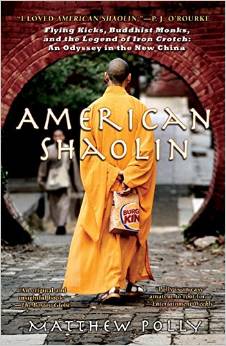Goodbye, Matt!
December 31, 1969I’m really going to miss Matthew Polly's book. He is the author of American Shaolin: Flying Kicks, Buddhist Monks, and the Legend of Iron Crotch, which is required reading in English Communications I. Shaolin has been the hands down favorite of the many books I have used over the last 13 years. On the cover is a photograph of a traditional monk dressed in his saffron-colored robes walking away from the camera clutching a Burger King bag behind his back—a fitting introduction to Matt’s story.
Matthew Polly was a sophomore at Princeton in 1992 when he decided he was going to use the rest of his tuition money to train in martial arts at the Shaolin Temple in China, home of the famous kungfu warrior monks. In the face of his parent’s disapproval and with little information about where or whether the Temple still existed, Matt set off on an adventure both funny and inspiring. He was largely driven by his list of “Things That Are Wrong With Matt”. He doubted his masculinity and his physical courage, was insecure around girls, and uncertain of his spiritual path. YouTube video clips of Matt’s first bouts with the kungfu monks show a tall, lanky kid towering over the small, wiry monks who systematically toppled him every few seconds. But he kept getting up and ultimately earned the respect of the monks as he demonstrated his willingness to “eat bitter”, i.e. suffer through the relentless training regimen at Shaolin.
 His story also introduces the reader to rural China, where a can of Coke is highly prized and “bottled water” is dangerous to drink because it comes from the polluted stream behind the Temple. The best medical care he receives is from the Temple’s janitor who makes a poultice with rat skin and other yucky ingredients that heals his sore knee, while the pills he gets from the local hospital do nothing to cure his recurring diarrhea. Matt learns to use “crazy foreigner kungfu” to get attention from store clerks and hospital personnel—all Americans are unpredictable to the Chinese, so when Matt yells and carries on, folks rush to accommodate him. And he discovers the central importance of “saving face” as he represents Shaolin in kickboxing matches and kungfu tournaments. (If Matt wins, reasons his coach, there will be great honor for Shaolin, but if he loses, no problem. Everyone knows that white foreigners are lousy at kungfu.) To everyone’s surprise, he won quite often!
His story also introduces the reader to rural China, where a can of Coke is highly prized and “bottled water” is dangerous to drink because it comes from the polluted stream behind the Temple. The best medical care he receives is from the Temple’s janitor who makes a poultice with rat skin and other yucky ingredients that heals his sore knee, while the pills he gets from the local hospital do nothing to cure his recurring diarrhea. Matt learns to use “crazy foreigner kungfu” to get attention from store clerks and hospital personnel—all Americans are unpredictable to the Chinese, so when Matt yells and carries on, folks rush to accommodate him. And he discovers the central importance of “saving face” as he represents Shaolin in kickboxing matches and kungfu tournaments. (If Matt wins, reasons his coach, there will be great honor for Shaolin, but if he loses, no problem. Everyone knows that white foreigners are lousy at kungfu.) To everyone’s surprise, he won quite often!
So for many students, Matt was a role model, someone who, like them, left family and friends to enter a new culture. He demonstrated that grit and determination are more important than raw talent, and physical comforts like a soft bed, hot water, and 24/7 media access can be distractions from learning rather than necessities.
Nevertheless, we’re saying good-bye to Matt and his book in the fall. Martial arts are not as exotic as they once were. Taekwondo schools have popped up in strip malls across America, kungfu busses pick up kids for after school classes, and Mom takes yoga on Tuesdays from 7-8 at the local Y. Even the grandparents are doing Tai Chi in the backyard. Matt’s adventures have lost their fascination …but I will miss the kid.


